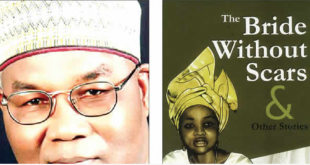 If this year is dry for some people, it has definitely been a fertile one for Bukar Usman. Or how does one tell the story of a writer who, at close to 75, is waxing so strong and creatively insatiable that he has just released four new beautiful books?
If this year is dry for some people, it has definitely been a fertile one for Bukar Usman. Or how does one tell the story of a writer who, at close to 75, is waxing so strong and creatively insatiable that he has just released four new beautiful books?
These are books with subjects ranging from security to policy matters, language and Usman’s first love: oral literature. Little wonder, this reviewer could not resist being intimidated when he received a bountiful parcel of the four new publications, as sent by the author — all beautifully produced.
The new works are titled Issues and Challenges of National Security, Public Policy Formulation in Nigeria – Challenges and Prospects, Language, Technology and Democratic Culture as well as The Bride without Scars and other Stories. The author is also generous enough to give book lovers a bonus, as a pamphlet titled Celebration and Preservation of Hausa Folk Music accompanies the freshly minted set.
While the first three books are products of lectures and other related programmes that Usman regularly gets involved in, The Bride Without Scars will grab a special place in the hearts of lovers of African literature. The 138-page book is a recreation of folktales, all exuding the ingenuity of the mind that reshaped their destinies. The reason is that Usman has not only preserved the tales told in the book, he has also elevated them, thus signalling the potential of African oral forms, most of which are on the brink of extinction.
Divided into three parts, the first comprises five stories involving human beings. These are the title story, The Bride without Scars; The King and his Marabout, The Old Woman and the Girl, Engaged to be Married Before her Birth and Destined to be Queen.
Section two centres on stories involving only animals. They are The Cat and the Unfaithful Rat, A Tale of Long and Short Beaks, Stealing Monkeys, The Spider and the Chief and The Hyena and the Hare.
Although delivered in simple language, the stories are generally interesting and engaging. The author particularly keeps the reader’s heart pulsating in The Bride without Scars, the story of a beautiful lady who swears that she will never marry any man with any kind of scar on his body. Well, she too has no scar on hers. But this unbridled taste eventually lands her in trouble as no man eventually qualifies to win her heart.
Instead, a gang of snakes, having learnt about the only criterion for capturing her, turns into human beings and storm her house with all the sweet promises of love and a blissful marriage. She eventually leaves with the beasts who come with a flawless skin. At last, however, they take her into the forest and imprison her in a tree hole, while they change back to their normal snake status. The way Usman resolves the conflict, introducing songs in the process, is one of the things the reader should find out.
In another story titled The Cat and the Unfaithful Rat, the two animals are very good friends who share the same house. But while the cat is faithful, the rat is dishonest and greedy, and this is what brings out the murderer in the cat, especially after the rat had looted the food bank they both toiled to produce.
The third part of The Bride without Scars is also very significant. Tagged ‘Story-Writing Workshops for Students’, it is a note to teachers and learners. Here, Usman teaches the reader some basic concepts or elements of literature, which include theme, plot, characterisation and humour.
The writer, indeed, deserves applause for rolling out the books, all of which are connected to national development. These are publications that are useful for individuals, schools, corporate, governmental and non-governmental establishments. And they are well written, painstakingly proofread and trendily printed.
Since Usman retired from the Presidency in 1999 as a permanent secretary, he has devoted his time to creative writing, research and folklore revival in Nigeria. He has won several awards while he is currently the President of the Nigerian Folklore Society. Usman has to his credit over 20 books, including 652-page compendium of Hausa language folktales titled Taskar Tatsuniyoyi.

